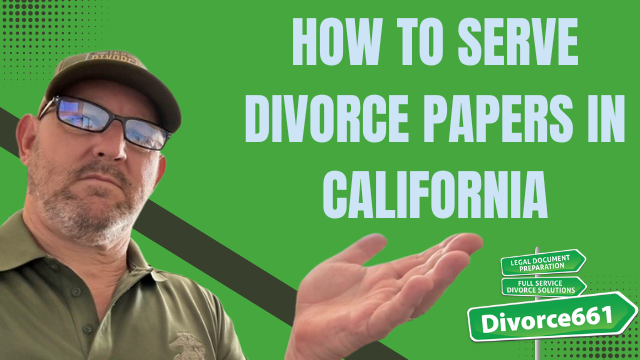How to Serve Divorce Papers in California
Hi, I’m Tim Blankenship with Divorce661. Serving divorce papers correctly is one of the most important steps in a California divorce. If it’s not done right, your case can be delayed or even rejected by the court. Below I’ll walk you through exactly what to do after you file, your service options, common mistakes to avoid, and a real client example that illustrates why proper service matters.
Why proper service matters
“If it’s not done right, your case can be delayed or even rejected by the court.”
Giving your spouse legal notice that a divorce has been filed is called service of process. Courts require proof that the other party received the documents. If service is done incorrectly, the court may not have jurisdiction to proceed, which means delays — sometimes weeks or longer — or even dismissal of your case until service is fixed.
What to do immediately after filing
After you file your initial paperwork (the Petition, Summons, and any required child custody forms), the court will stamp and return your filed copies with a case number. Those returned copies are what you use to serve your spouse. Don’t skip this step — service must follow the court’s filing.
Two primary ways to serve divorce papers in California
1. Service by mail with a Notice & Acknowledgment of Receipt (NAR)
This is the easiest, cleanest method if your spouse is cooperative.
- Mail the filed copies of the Petition and Summons along with a Notice & Acknowledgment of Receipt (commonly called a NAR).
- Your spouse signs and returns the NAR to you (or your attorney), acknowledging they received the papers.
- File the signed NAR with the court to prove service — no personal service required.
This avoids having to track down someone to personally hand the papers to your spouse, and it’s often the fastest option when both parties cooperate.
2. Personal service (when mail won’t work)
If your spouse won’t cooperate or won’t return the NAR, personal service is required.
- Personal service means someone physically hands the documents to your spouse.
- The person who serves must be over 18 and cannot be you.
- That person can be a friend, relative, or a professional process server. Many people hire a process server to ensure it’s done properly.
- After service, a Proof of Service of Summons must be completed and filed with the court to show the documents were delivered correctly.
Proof of Service: what the court needs
Whether you serve by mail with a signed NAR or by personal service, the court expects paperwork proving service was completed. That’s typically one of these:
- Signed Notice & Acknowledgment of Receipt (NAR) filed with the court (for mail service).
- Proof of Service of Summons (filed by the person who personally served the documents).
File the appropriate proof promptly. If the court doesn’t have proof of service, your case won’t move forward.
Real client example: why email isn’t enough
We recently had a client who thought emailing the divorce papers to their spouse was sufficient. It wasn’t. The court rejected the email as valid service, and the case was stalled for weeks while we corrected the problem.
We stepped in, arranged proper service (personal service), and filed the required Proof of Service, which got the case back on track. The takeaway: digital delivery like email is not an acceptable substitute for the court-mandated methods listed above.
Practical tips and a quick checklist
- Always use the court-stamped filed copies when serving — those include your case number.
- If your spouse will sign a Notice & Acknowledgment of Receipt (NAR), use mail service — it’s simple and clean.
- If your spouse refuses to cooperate, hire a process server or ask a friend/relative over 18 (not you) to personally serve the documents.
- Never attempt to serve documents yourself.
- File the appropriate Proof of Service or signed NAR immediately after service.
- Avoid email or other informal delivery methods — courts generally do not accept them as valid service.
- Keep copies of everything and track dates carefully; deadlines matter in family law.
How Divorce661 can help
At Divorce661 we handle the entire service process for clients. Whether your spouse is cooperative or not, we make sure service is done legally and correctly so your case moves forward without delay. If you filed for divorce in California and aren’t sure how to serve your spouse, visit divorce661.com to schedule a free consultation. We’ll walk you through it or handle it for you — saving you time, stress, and frustration.
Conclusion
Proper service of divorce papers is not optional — it’s required. Use the Notice & Acknowledgment of Receipt when possible, arrange personal service when necessary, and always file the correct proof with the court. Doing it right the first time keeps your case moving and avoids costly delays. If you need help, go to divorce661.com and schedule your free consultation.

